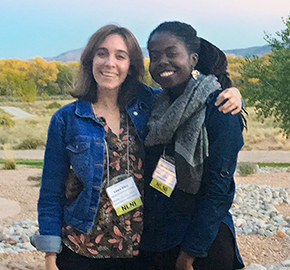Reflections on the NLNI Fall 2016 Meeting
Laura Riker, RHAP Program Manager
 Naomi (RHAP’s Operations Associate) and I were able to attend the New Leadership Network Initiative (NLNI), a project of CLPP, a reproductive-justice focused organization. Reproductive justice holds that everyone should have the social, political, and economic power and resources to make their own decisions about their gender, bodies, and sexuality for themselves, their families, and their communities. Using a reproductive justice framework means lifting up the voices of individuals and communities who are most impacted by reproductive oppression. NLNI provides space for learning, training, and collaboration between emerging leaders in the reproductive justice movement.
Naomi (RHAP’s Operations Associate) and I were able to attend the New Leadership Network Initiative (NLNI), a project of CLPP, a reproductive-justice focused organization. Reproductive justice holds that everyone should have the social, political, and economic power and resources to make their own decisions about their gender, bodies, and sexuality for themselves, their families, and their communities. Using a reproductive justice framework means lifting up the voices of individuals and communities who are most impacted by reproductive oppression. NLNI provides space for learning, training, and collaboration between emerging leaders in the reproductive justice movement.
This fall’s meeting was in beautiful Bernalillo, New Mexico. We opened with a water blessing, where folks brought water from their hometowns and shared what water means to them. The next day we attended several workshops, starting with a panel on expanding and de-stigmatizing reproductive health in New Mexico hosted by the ACLU New Mexico and Young Women United. Unlike surrounding states, New Mexico does not have any TRAP (targeted regulation of abortion providers) laws or major abortion restrictions such as waiting periods and parental consent, and Medicaid will cover abortion. This is thanks to the tireless work of activists and advocates who have successfully fought to keep abortion accessible. Unfortunately, just as threats towards reproductive health access have grown nationally, they have also increased in New Mexico. As such, organizers on the ground continue to fight these threats by lifting up the voices of communities most affected by restrictive and harmful laws.
The Sadie Nash Leadership Project and KIMBRITIVE led a workshop during which we used reproductive justice principles to develop prototypes of tools (such as social media campaigns and mixed-media projects) that can be used to engage young people in the reproductive justice movement. This hands-on workshop really encouraged me to think creatively about how we can build leadership and develop advocates in non-traditional ways. Later that day, I participated in a conversation led by a representative from the Prison Birth Project on using the needs of our movement to fundraise in ways that hold true to social justice principles and think beyond the non-profit industrial complex.
On Saturday, we had the unique opportunity to attend the Gathering for Mother Earth, organized by Tewa Women United, a Native Woman-led community based organization that addresses the challenges of reproductive health and justice for Indigenous women. We participated in a talking circle about the intersections between reproductive and environmental justice – an issue that I don’t think about in my everyday life in New York City but that is so critical to the reproductive health and wellness of communities.
The weekend was a great opportunity for us to network with organizations within the reproductive justice movement and beyond. The incredible folks that I met at NLNI helped me broaden my own personal understanding of the intersections between reproductive justice and other social justice movements, and gave me a lot of food for thought for the work that RHAP can do as an organization to incorporate more reproductive justice elements into our programs.
